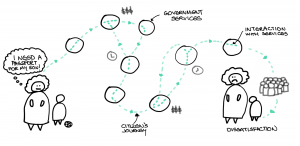By Loyce Kyogabirwe |
As society’s watchdog, the media plays the important role of documenting people, events and developments for purposes of public informing the public. This includes the task of educating and mobilising communities through their content. However, there is a growing concern whether the media is playing these roles to its full extent including in promoting good governance and public accountability at community levels.
Continue Reading →
Author: juliet
Privacy & Protection: Do Ugandans Care What Happens to Their Data?
By Neema Iyer |
Let’s be honest.
When was the last time you read the “Terms and Conditions” before you signed up for a new service online?
We don’t blame you. It’s easy to get lost in the legal jargon.
But do you know what happens to your personal data every time you click on “I have agreed to terms and conditions”? Did you know at the mere click to accept, you could have given a way a portion of your vital information and put your data privacy in absolute jeopardy?
CIPESA-ICT4Democracy Academia Fellowship Programme
Fellowship Opportunity |
Do you have an idea on #ICT #ICT4D which you’d like to explore? Submit your idea to the CIPESA-ICT4Democracy #Media or #Academia Fellowship Programme. The next deadline is April 1st!! See links below.
Academia: http://bit.ly/2FQ4QO9
#ICT4DemEA
CIPESA-ICT4Democracy Media Fellowship Programme
Fellowship Opportunity |

Do you have an idea on #ICT #ICT4D which you’d like to explore? Submit your idea to the CIPESA-ICT4Democracy #Media or #Academia Fellowship Programme. The next deadline is April 1st!! See links below
Media: http://bit.ly/2GaOyyx
#ICT4DemEA
Promoting Public Accountability in Education and Agriculture Sectors in Rwenzori Region
News Update|
The agriculture and education sectors are identified among the primary growth sectors in the Uganda’s National Development Plan. However, despite consistent state budget allocation increments in recent years and high absorption rates, various challenges persist at implementation and service delivery. For instance, in the Financial Year 2015/16, the education sector under primary education, planned to construct 22 primary schools and 200 classrooms but only one school and two classrooms were constructed. Indeed, in the Rwenzori region in western Uganda, citizens are decrying poor services under government programmes.
Continue Reading →
Solving Uganda’s Challenges through Data & Service Design
By Neema Iyer
Last week, we asked “What is Service Design?” and answered our question with “Service design is the process of taking a service and better tailoring it to the needs and wants of the end user, whether that’s a client, customer or in the case of civic service design, the citizen. It could be improving an existing service, or creating a new service totally from scratch.”
On December 5th, Pollicy and the Collaboration in International ICT Policy for Eastern and Southern Africa (CIPESA) brought back the civic technology community in Uganda, but this time, with a focus on data and design. As issues of data ownership, digital security, censorship become more pertinent in our society, so does the need to appropriately harness the benefits of big data. Through a series of interesting panel discussions, lightening talks and a hands-on design training, we took participants through a journey on how data can be used to revolutionize how citizens and governments interact for mutual benefit.
Harnessing the Data Revolution for National Development: The Case of Uganda
By Loyce Kyogabirwe|

The United Nations (UN) has recognised data as a key factor for achieving and monitoring sustainable development. Indeed, the push for open data that contributes to government transparency and accountability and promotes citizens’ right to information and innovation through the Information and Communication Technology (ICT) sector continues to gain prominence globally, including in Africa.
In Uganda, the government is geared towards contributing to the emerging data revolution for sustainable development. Since 2016, the country has been party to the African Charter of Statistics and is also working to implement the UN Fundamental Principles of National Official Statistics as well as the Cape Town Action Plan. Uganda has also developed the National Development Plan and is party to regional development agendas such as Agenda 2063 and the East African Community’s Vision 2050.
Continue Reading →
Use of ICT to Improve the Health of Preterm Infants in Kenya
Neonatal mortality remains a key issue of public health concern in Kenya and currently stands at 22 per 1,000 live births [2]. Premature births (less than 37 completed weeks of gestation) accounts for 12% of all under 5 mortality in Kenya and approximately over 180,000 infants in Kenya are born prematurely every year [3]. Preterm infants need admission to a Neonatal Intensive Care Unit (NICU) where care is mainly focused on infants thus neglecting the role of mothers. Most mothers of infants born prematurely often suffer from depression, grief, and guilt, which are rooted in not giving birth to a healthy baby [1,10]. Extended periods of separation from the baby, the absence of information or lack of understanding, loss of parental roles, fear of possible outcome and lack of communication with health care providers aggravate the difficulties experienced by mothers regarding prematurity [9, 10].
Continue Reading →
What is Civic Service Design? A tale of Citizen Satisfaction in Uganda and beyond
By Neema Iyer
As a taxpayer in Uganda, trying to access services that you are fully entitled to can be a serious headache. Take for example, the process of procuring a passport for the first time. Most of us have been there and might prefer to get a root canal procedure instead of repeating the process. You may say that these processes were designed without any direction. And you might be right!
Civic Technology in Uganda: A Data & Design Perspective
Workshop |

Are you a techie that’s looking to harness technology and design for the public good? Are you part of a government department or civil society organization interested in how data can improve public service delivery? Want to know what “service design” is all about? Then, this is the event for you!
We have partnered with Pollicy, a civic technology organisation and are excited to bring you the latest in civic technology in Uganda, with a focus on data and design. As issues of data ownership, digital security, censorship become more pertinent in our society, so does the need to appropriately harness the benefits of big data.

